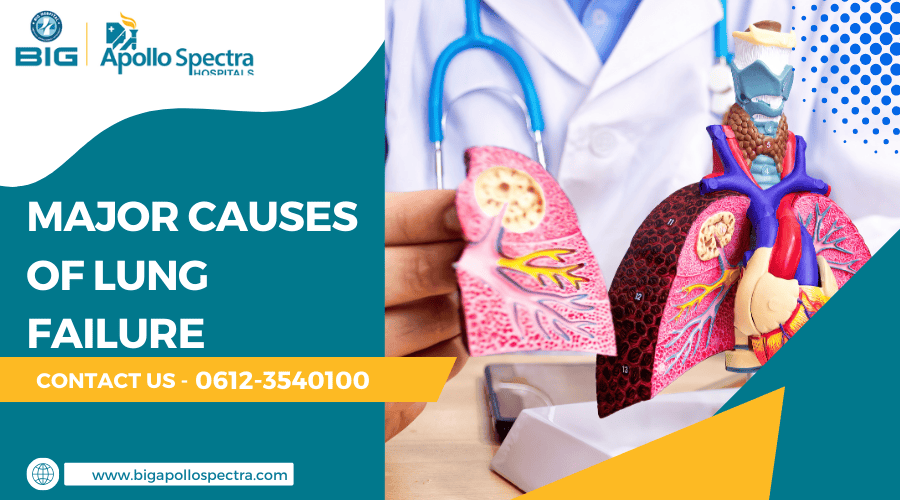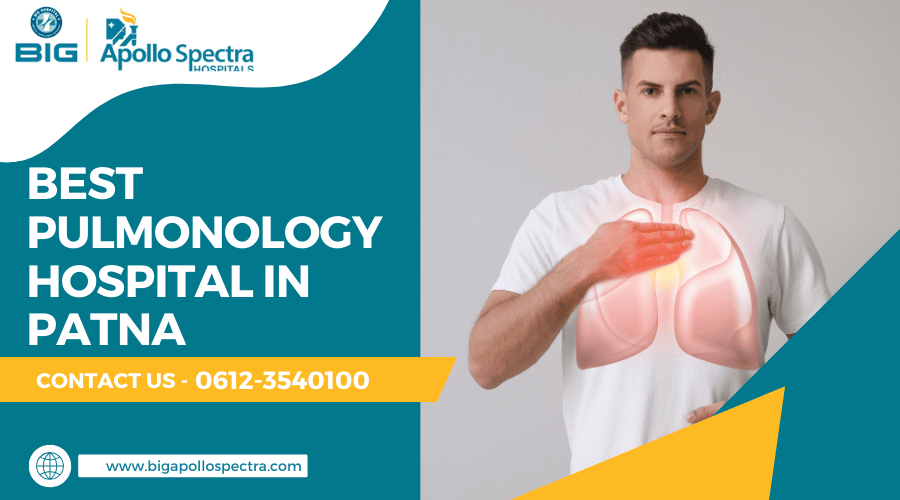Lung failure, a serious medical condition, can result from various underlying causes ranging from Type 1 Respiratory Failure to chronic diseases such as asthma, chronic obstructive pulmonary disease (COPD), or even acute respiratory distress syndrome (ARDS).
Understanding the root causes and timely intervention are paramount in mitigating the risks associated with lung failure.
At Big Apollo Spectra Best Hospital In Patna we pride ourselves on our comprehensive approach to respiratory care.
With state-of-the-art facilities and a team of skilled Respiratory Failure Pathophysiology professionals, we are dedicated to diagnosing, treating, and managing lung-related conditions with precision and compassion.
Trust us to provide unparalleled care to your individual needs, ensuring the best possible outcomes for your respiratory health.
Causes Of Lung Failure
Lung failure, can have various Respiratory Failure Types, including:
#1. Chronic Obstructive Pulmonary Disease (COPD):
The medical condition termed Chronic Obstructive Pulmonary Disease (COPD), embraces chronic bronchitis, emphysema as well.
You see, COPD is frequently the offender behind lung failure. Now this is interesting to note – it’s typified by enduring challenges in breathing and also unpleasantly noticeable decline in airflow.
#2. Acute Respiratory Distress Syndrome (ARDS):
Pivoting our attention towards Acute Respiratory Distress Syndrome (ARDS) now, turns out various severe infections or trauma can bring it about.
You could even get it from breathing in nasty stuff! It’s not just limited to these causes though; any other lung injury has similar effects as well.
#3. Pneumonia:
Particularly, when bacteria or viruses are the culprits, there’s potential for Respiratory Failure Death if you don’t jump on treatment right away.
What pneumonia does is cause inflammation and accumulation of liquid in the lungs’ tiny air bubbles so that oxygen exchange gets messed up.
#4. Pulmonary Embolism:
This is when a blood clot makes a trip to the lungs and ends up blocking the flow of blood. This may result in abrupt trouble with breathing, if a sizable clot blocks blood circulation to a major part of the lung.
You can also read about >>>> Factors that Trigger Asthama
#5. Interstitial Lung Disease (ILD):
Interstitial Lung Disease, or ILD for short, is a cluster of Respiratory Failure Types. Each one uniquely identified by inflammation and fibrosis prone to occur within lung tissue.
As this process continues unchecked over time linked directly to hampered pulmonary function potentially leading all the way down the road to respiratory failure.
#6. Asthma:
Really bad asthma attacks may lead to breathing failure by greatly tightening the air passages, making it tough for a person to breathe.
#7. Cystic Fibrosis:
This particular genetic ailment impacts both your lungs and the system responsible for digestion. Ultimately, it makes way for an unhealthy level of mucus that is rather thick and sticky in your airways.
By way of incessant infections and gradually increasing damage to the lung.
#8. Lung Cancer:
Advanced lung cancer has the potential to lead to respiratory failure. This can either happen if it blocks the airways or spreads outwards invading other parts of your body, lungs included.
#9. Neuromuscular Disorders:
Conditions like muscular dystrophy or amyotrophic lateral sclerosis (ALS) may cause breathing difficulties, leading to respiratory failure. This is primarily due to the weakening of the muscles that aid in respiration.
#10. Severe Trauma or Injury:
Damage from traumatic injuries to the chest or spinal cord might mess with your breathing and cause respiratory failure.
These are just a bit of examples, besides; there can indeed be alternate factors too when you give it a thought. It’s important, to check the root cause that led to lung failure!
This would subsequently help provide suitable treatment as well as support. Fast response from Patna Best Hospital is downright vital for cases dealing with respiratory distress or failure.
Symptoms of Lung Failure
Now this can show up through a myriad of symptoms and these actually rely on what caused the problem rather than its severity level.
The most typically observed Signs Of Death From Respiratory Failure are:
- Shortness of breath (dyspnea): Struggling with your breath or feeling like you just can’t seem to gulp enough air.
- Rapid breathing (tachypnea): It’s when your body ramps up your breathing rate, trying to make up for not getting enough oxygen.
- Cyanosis: it’s when your lips, nails, or skin take on a bluish colour because there isn’t enough oxygen in your blood.
- Confusion or altered mental status: When the brain isn’t getting enough oxygen, it can result in confusion, you might feel disoriented, or could even faint.
- Fatigue: When you feel super tired or weak because there’s not enough oxygen getting to your tissues.
- Wheezing or crackling sounds: These are unusual sounds you might hear when breathing. They suggest there may be fluid accumulated, or possibly some kind of inflammation in the lungs.
- Cough: If you keep coughing persistently and even sometimes spot phlegm or blood in serious situations, that’s a symptom.
- Increased heart rate (tachycardia): So, the heart might start pumping a bit quicker to make up for the dip in oxygen levels found within our blood.
- Anxiety or restlessness: Feeling a bit on edge or fidgety due to breathing troubles and low oxygen levels can bring about anxiety or restlessness.
- Increased work of breathing: Look out for visible indents showing up on the skin between their ribs or above the collarbones with every breath, you might also notice use of extra muscles, or even a slight flaring of their nostrils.
- Decreased oxygen saturation: If you start to feel any of these symptoms, especially if they’re heavy-duty or just won’t go away, you really should head over to the doctor straight away.
Sometimes it can be a matter of life and death – respiratory failure is no game and needs quick action.
Treatment For Lung Failure
The handling of the problem involves a mix of steps for support, medicinal aids, and moves to enhance functioning in the lungs; this is all coupled with addressing the root cause.
Let’s check some Type 2 Respiratory Failure Treatment used when it comes to lung failure:
#1. Oxygen Therapy:
Supplemental oxygen is often the first-line treatment for respiratory failure. It can be administered through nasal prongs, a mask, or mechanical ventilation (a ventilator) in severe cases.
#2. Mechanical Ventilation:
Should an individual end up in a state of acute respiratory failure, it might just be indispensable to provide assistance for breathing through mechanical ventilation.
This methodology goes the extra mile by pumping oxygen into the lungs and moreover getting rid of carbon dioxide from within your system.
#3. Medications:
Depending on what’s causing the lung failure, different medicines might be recommended.
#4. Bronchodilators:
These medicines aid in expanding your airways and boosting airflow, pretty useful stuff for ailments like asthma or chronic obstructive pulmonary disease (COPD).
#5. Corticosteroids:
Doctors might prescribe these drugs to tone down inflammation in the lungs when dealing with issues such as acute respiratory distress syndrome (ARDS).
#6. Diuretics:
If you’re dealing with fluid buildup in your lungs, often known as pulmonary edema, diuretics could be suggested to help boot out the excess fluid.
#7. Treatment of Underlying Conditions:
It’s critical to address root problems like pneumonia, COPD, asthma or pulmonary embolism when trying to control lung failure.
#8. Positioning:
Simple techniques like raising the head of the bed a bit or simply having the patient lay on their side can pretty effectively aid in better lung function and oxygenation.
#9. Physical Therapy:
Sometimes, a good round of physical therapy or respiratory therapy could be just the thing to clear up secretions from the lungs and give a bit of boost to your respiratory muscle strength.
#10. Extracorporeal Membrane Oxygenation (ECMO):
Type 2 Respiratory Failure Treatment unresponsive to regular treatments. In such grim situations, Extracorporeal Membrane Oxygenation (ECMO) might come into the reckoning.
Acting as a respite for heart and lung function, ECMO takes charge by enriching blood with oxygen out of body boundaries.
#11. Lung Transplantation:
When dealing with end-stage lung disease, one could think about lung transplantation as a potential way to go.
Choices regarding treatment ought to be discussed with Best Pulmonologist Near Me, considering things like your particular ailment, past medical records and overall well-being.
Factors Contributing to the Onset of Lung Failure
The reasons behind its occurrence can be many—it could spring from nasty bugs causing respiratory infections or long-term illnesses like asthma and chronic obstructive pulmonary disease (COPD), even severe conditions such as acute respiratory distress syndrome (ARDS).
Getting to the bottom of what causes it and stepping in that’s vital if we want to lessen the risks that come along with a case of lung failure.
And you know what? That’s our mission at Big Apollo Spectra Super Speciality Hospital In Patna—we’ve got more than just care for your lungs; ours is truly an all-inclusive approach.
We’ve got the latest facilities at our fingertips and a medical squad thats skillful. In managing lung-associated ailments, let’s just say we’re as precise as they come and compassionate about it too.
We pride ourselves on delivering care towards respiratory health—be assured of this from us!





